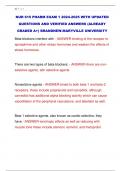1|Page
NUR 615 PHARM EXAM 1 2024-2025 WITH UPDATED
QUESTIONS AND VERIFIED ANSWERS (ALREADY
GRADED A+) BRANDNEW-MARYVILLE UNIVERSITY
Beta-blockers interfere with - ANSWER-binding of the receptor to
epinephrine and other stress hormones and weaken the effects of
stress hormones.
There are two types of beta-blockers; - ANSWER-there are non-
selective agents, adn selective agents
Nonselctive agents - ANSWER-bined to both beta-1 and beta-2
receptors, those include propranolol and carvedilol, although
carvedilol has additional alpha blocking activity which can cause
vasodilation of the peripheral vasculature, and labetalol as well.
Beta 1 selective agents, also known as cardio selective, they
have - ANSWER-ionotropic effects as well as reducing with
muscle tone these include atenolol, esmolol, and metoprolol.
,2|Page
beta blocker treatments: - ANSWER-: tx of cardiac D/Os, HF,
anxiety, migraine, tachy r/y hyperthyroidism. Work by latching on
the BB rec. site and prevent those sites from the catecholamines
being able to latch onto those sites
Beta-adrenergic blockers, the most widely used adrenergic
blockers, work by: - ANSWER-preventing stimulation of the
sympathetic nervous system by inhibiting the action of
catecholamines at beta-adrenergic receptors.
Pharmacokinetics of Beta-adrenergic blockers - ANSWER-they
are usually absorbed rapidly and well from the GI tract and are
somewhat protein-bound. Food doesn't inhibit—and may even
enhance—their absorption. Some betaadrenergic blockers are
absorbed more completely than others. Beta-adrenergic blockers
have widespread effects in the body because they produce their
blocking action not only at adrenergic nerve endings but also in
the adrenal medulla.
What are the adverse effects of beta-blockers? (16) - ANSWER-
hypotension, bradycardia, peripheral vascular insufficiency,
atrioventricular block, heart failure, fatigue, bronchospasm,
,3|Page
diarrhea or constipation, nausea and vomiting, abdominal
discomfort, anorexia, flatulence, rash, fever with sore throat,
spasm of the lower neck, respiratory distress as an allergic
response.
Adverse effects associated with beta-2 adrenergic receptor
antagonists' activity will include - ANSWER-bronchospasm,
peripheral vasoconstriction, alteration of glucose and lipid
metabolism, specifically hyperlipidemia, impaired insulin release.
These are less common with the beta 1 selective or cardio
selective agents but receptor selectivity diminishes at higher
doses.
Beta blockade especially the beta 1 receptor at the macula densa
inhibits - ANSWER-renin release thus decreasing the release of
aldosterone this cause hyponatremia and hyperkalemia.
Beta 1 selected blockers can increase - ANSWER-plasma lipid
levels and glucose levels and diabetics they may also interfere
with oral hypoglycemics.
, 4|Page
In general, beta blockers should be avoided in - ANSWER-
diabetics.
Beta blockers are also contraindicated in patients with -
ANSWER-asthma
Beta-blockers should be avoided in patients with a history of -
ANSWER-cocaine use or cocaine induced tachycardia.
adverse drug reactions associated with use of beta-blockers
include (22) - ANSWER-nausea, diarrhea, bronchospasm,
dyspnea, cold extremities, exacerbation of Raynaud's, syndrome,
bradycardia, hypotension, heart failure, heart block, fatigue,
dizziness, alopecia, abnormal vision, hallucinations, insomnia,
nightmares, sexual dysfunction, erectile dysfunction, and or
alteration of glucose and lipid metabolism
What effect will result with rapid withdrawal of a beta-blocker? -
ANSWER-You can see a coronary artery spasm that will result in
MI, this is most often seen in patients with coronary artery




